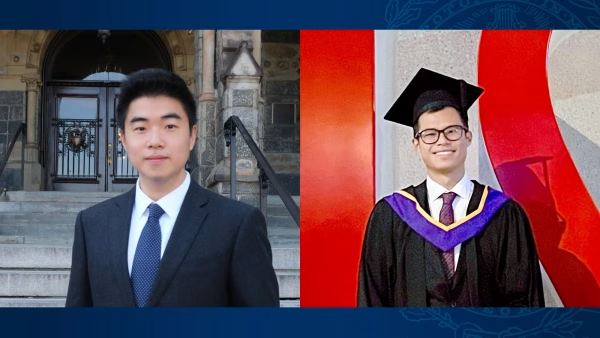Two Hoyas received the prestigious Schwarzman Scholarship, an award that funds one year of postgraduate study in China, the organization announced Jan. 15.
Georgetown University graduate Shaun Ho (SFS ’20) and current senior Harry Yang (SFS ’25) were two of 150 scholarship winners out of almost 5,000 applicants and became the 15th and 16th Georgetown affiliates to win the scholarship. Now in its 10th year, the program admits students to a fully-funded master’s degree in global affairs at Schwarzman College, Tsinghua University in Beijing.
Full Disclosure: Harry Yang formerly served as a Staff Writer for The Hoya from Fall 2023 to Spring 2024.
Ho, who majored in regional and comparative studies and minored in Jewish civilization while at Georgetown, said his upbringing in Macau encouraged him to apply to the program and learn more about his country.
“While I am Chinese, I feel that I don’t fully understand China because I am from Macau, which is a former Portuguese colony that was handed over to China only 25 years ago,” Ho wrote to The Hoya. “As such, the Schwarzman Scholarship is a great opportunity for me to learn about my own country in a global context.”
Ho said he wants to use the program to launch a project tackling climate change through international policy.
“I am personally very interested in environmental protection, in particular how different countries can cooperate to combat climate change through environmental policy and international agreements,” Ho wrote.

Yang said he wants to use the scholarship to pursue international law, focusing on international cultural heritage and the repatriation and protection of artifacts.
“I’m interested in how international law can help a country that’s been formally colonized get their relics back from the British Museum,” Yang told The Hoya. “Or if there’s a conflict in Armenia or somewhere, like how do we protect their churches? How do we protect their ruins from 3,000 years ago? How do we do that?”
Yang, who transferred to Georgetown from the Rhode Island School of Design as a junior to study culture and politics, said his dual interest in art and policy shapes how he views international affairs.
“I think I have a very interdisciplinary background because I spent the first two years in a more artistic background,” Yang said. “Later, I transferred to the SFS, and I found a way to really combine my interest in art and culture with my passion for international relations.”
Rochelle Davis, a professor who taught Yang in her “Culture Heritage in the Arab World” course, said Yang’s remarkable curiosity and intellect made him the perfect candidate for the scholarship.
“Harry is such a curious person — he’s like an omnivore,” Davis told The Hoya. “He’s really fearless, and he adds to the group and pushes other students to think about things in a different way. He really thinks outside the box in ways that even push me sometimes to think differently.”
Davis said she saw that Yang’s studies at Georgetown helped influence his interests and passion.
“He’s at a great place here at Georgetown to sort of launch himself into a new world, and he’s really brought that curiosity into his coursework,” Davis said. “He’s an example of what Georgetown does very well: creating educational opportunities for students to really find themselves and flourish.”
Yang said he is interested in learning more about Chinese development and understanding the role it will play in global politics.
“I’m really interested in exploring and thinking about the role China is going to play in the future world — what kind of role it’s going to play internationally in the next 20, 30 years,” Yang said. “We have a lot of programs that allow us to travel across the country to really see how China’s developing, how people have collectively made it possible.”
Yang said he hopes his time as a Schwarzman Scholar will teach him how to be a global leader by working with people across cultural differences.
“I think the world is facing a lot of crises at the moment, and it needs a collective effort to really make the world a better place,” Yang said. “I think this requires a global vision. We can find the common parts that we can work together while having our differences. I think having that kind of leadership to be able to help the world navigate through these challenges is really important.”